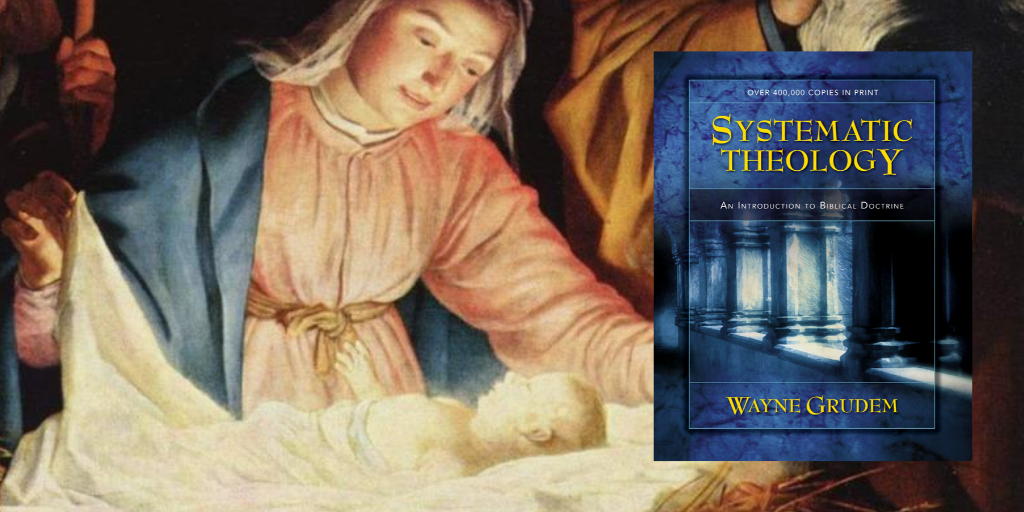Reading Systematic Theology with Wayne Grudem – How is Jesus fully God and fully man, yet one person?
This post is part of a 50+ post series from the classic work by Wayne Grudem (PhD, Cambridge), Systematic Theology: An Introduction to Biblical Doctrine. The aim of each post is to provide an overview of each chapter in the book and related resources for each topic.
Synopsis of Chapter
In this first chapter in Part 4 of the Doctrines of Christ and the Holy Spirit, Wayne Grudem reviews the Person of Christ. He discusses the humanity of Jesus and the divinity of Jesus and what each aspect represented. He summarized the person of Christ as: “Jesus Christ was fully God and fully man in one person, and will be so forever.”
Toward the end of the chapter, Grudem discusses three inadequate views about the person of Christ. He then summarizes what the Church has historically taught about the person of Christ in the Chalcedonian Creed (451 AD).
The Humanity of Christ
Jesus’ birth was unique in that he was born to a virgin. He was conceived by the Holy Spirit in his mother Mary without the aid of a man (Matthew 1:18). Jesus was conceived in a virgin and was virgin born. The virgin birth of Christ seems to clearly display his deity since no other person had been born to a virgin. But it also displays Christ’s humanity. Jesus did not descend from on high with no connection to humans. Instead, he was born to a human family just like every other person was born to humans since Adam and Eve.
Jesus’ humanity was normal. He had a real body with the needs of a real human. There are many ways Jesus’ humanity was displayed in Scripture, including…
- Jesus claimed he had a real body, even after his resurrection (Luke 24:39)
- Jesus had human emotions being “troubled in spirit” (John 12:27).
- Jesus learned obedience through suffering (Hebrews 5:8-9).
- Jesus was weak from carrying his cross (Luke 23:46).
- Jesus learned or “increased in wisdom” (Luke 2:52).
- Jesus wearied from his journey (John 4:6).
- Jesus increased in stature (Luke 2:52).
- Jesus was hungry (Matthew 4:2).
- Jesus was thirsty (John 19:28).
- Jesus wept (John 11:35).
- Jesus ate (Luke 24:42).
But Jesus’ humanity was different in one distinct aspect from other humans: he was sinless. Jesus did not sin (Hebrews 4:15). Even his earthly judge, who wrongfully condemned him to death, affirmed he was not guilty of a crime. When judging him before his crucifixion, Pontius Pilate declared, “I find no guilt in him.” (John 18:38). He was tempted just like every other person, but never succumbed to temptation. Jesus was sinless.
So why was Jesus, the Son of God, born as a human? There are several reasons Scripture gives to explain why Jesus had to be a man. For one, Jesus had to be a representative in his nature. Paul called Jesus the “last Adam” (1 Corinthians 15:45) because he represented humanity in the same way as the “first Adam.” Secondly, he became a sacrifice similar to those he was sacrificed for, “Therefore he had to be made like his brothers in every respect, so that he might become a merciful and faithful high priest in the service of God, to make propitiation for the sins of the people” (Hebrews 2:17). A third reason Jesus had to be a human was his role as mediator between God and men (1 Timothy 2:15). A purely divine entity could not be a sympathetic mediator in the same way a human mediator can be (Hebrews 2:18).
The Deity of Christ
But Jesus was not just a man – Jesus was fully divine. There are both direct Scriptural claims and implications from the Bible that teach Jesus’ divinity. Here are a few reasons we know Jesus is God.
- The New Testament uses the Greek word for ‘God’ (theos or θεός) to describe Jesus (John 1:1, 1:18, 20:28, Romans 9:5, Titus 2:13, Hebrews 1:8, 2 Peter 1:1).
- ‘Lord’ (kurios or κύριος) is used to describe Jesus. This is the same word the Greek Old Testament (Septuagint) translated the formal name for God (yhwh, יְהוָֹה). This indicates the New Testament authors believed Jesus was God from the Old Testament (Matthew 3:3, Luke 1:43, 2:11, 1 Corinthians 8:6).
- Jesus claimed to be the “I am,” the same name for the Old Testament God. (Exodus 3:14, John 8:58).
- Jesus called himself the “Son of man” 84 times in the four gospels – see Matthew 16:13, etc). This was a Messianic title given in Daniel the Prophet (Daniel 7:13-14).
- Jesus is the creator of the world which is something only God could do (John 1:3).
- The disciples believed he knew everything, an attribute of God (John 16:30, 21:17).
- Jesus was worshiped by his disciples and angels (Hebrews 1:6, Revelation 19:10).
- Speaking of Jesus, Paul said, “For in him the whole fullness of deity dwells bodily” (Colossians 2:9).
The Incarnation: Deity and Humanity in One Person
The doctrine that God became a man is known as the “incarnation”. Although the word is not found in the Bible, it encapsulates what the Scriptures teach concerning Jesus’ divinity and humanity. In the incarnation, God took on flesh (Latin: carni) and became a human. The humanity and divinity in one person properly describe Jesus’ nature. This was summarized in the Chalcedonian Creed in AD 451 from carm.org:
—
We, then, following the holy Fathers, all with one consent, teach men to confess one and the same Son, our Lord Jesus Christ, the same perfect in Godhead and also perfect in manhood; truly God and truly man, of a reasonable [rational] soul and body; consubstantial [co-essential] with the Father according to the Godhead, and consubstantial with us according to the Manhood; in all things like unto us, without sin; begotten before all ages of the Father according to the Godhead, and in these latter days, for us and for our salvation, born of the Virgin Mary, the Mother of God, according to the Manhood; one and the same Christ, Son, Lord, only begotten, to be acknowledged in two natures, inconfusedly, unchangeably, indivisibly, inseparably; the distinction of natures being by no means taken away by the union, but rather the property of each nature being preserved, and concurring in one Person and one Subsistence, not parted or divided into two persons, but one and the same Son, and only begotten, God the Word, the Lord Jesus Christ; as the prophets from the beginning [have declared] concerning Him, and the Lord Jesus Christ Himself has taught us, and the Creed of the holy Fathers has handed down to us.
—
So the Chalcedonian understanding of the nature of Christ combined three important aspects: that Jesus is completely human, that Jesus is completely divine, and that he is only one person. Although the doctrine is mysterious, it is what the Bible affirms concerning the person of Christ.
There were other alternative understanding about the nature of Christ. For instance, Apolllinarianism teaches that Christ had a human body, but not a human mind or spirit. In Nestorianism, there were separate persons in Jesus: a human person and a divine person. And Monophysitism, aka Eutychianism, taught Jesus only had one nature: his human nature and divine nature were absorbed to create a new nature. In all of these heterodox views, they deny the complete humanity, complete divinity, or single personhood of Jesus.
Application: “The Most Amazing Miracle of the Entire Bible”
Finally, we cannot overlook the importance of the incarnation. In his closing remarks in the chapter, Wayne Grudem highlights the gravity of the incarnation of Jesus Christ:
“It is by far the most amazing miracle of the entire Bible – far more amazing than the resurrection and more amazing even than the creation of the universe. The fact that the infinite, omnipotent, eternal Son of God could become man and join himself to a human nature forever, so that infinite God became one person with finite man, will remain for eternity the most profound miracle and the most profound mystery in all the universe.”
“And the Word became flesh and dwelt among us, and we have seen his glory, glory as of the only Son from the Father, full of grace and truth.” (John 1:14)
Special Terms
- Apollinarianism
- Arianism
- Chalcedonian Definition
- communication of attributes
- docetism
- Eutychianism
- God
- hypostatic union
- impeccability
- incarnation
- kenosis theory
- Logos
- Lord
- Monophysitism
- monothelite view
- Nestorianism
- Son of God
- Son of Man
- virgin birth
Resources: Wayne Grudem
- Wayne Grudem: Book: Systematic Theology: An Introduction to Biblical Doctrine
- Wayne Grudem: 148 Lectures on Systematic Theology
Related Resources
- OpenBible.info: Verses on Jesus Christ
- Keith Mathison: An Introduction to Orthodox Christology
- Monergism: The Definition of the Council of Chalcedon (451 AD)
- Joseph R. Nally, Jr: Christological Heresies (with links)








